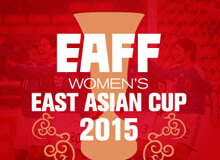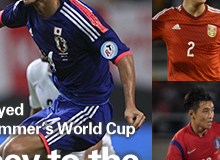The winners of the men’s finals of the EAFF East Asian Cup 2015 with one win and two draws (making for a total of 5 points) was Korea REP. With German manager Stielike joining the team last September, the team has taken an active role in involving young players, and despite not including footballers from European and Middle Eastern leagues, the manager also avoided selecting veterans from the K-League.
The team therefore entered the competition with a squad composed predominantly of hopeful green players and middle-ranking players with very little experience playing for the national team. That said, the team showed their ability to work closely as a group when they defeated China PR 2-0, with the players grasping the idea behind playing for the national team. Within that space, the individual squad members were able to display their own personal attributes by both producing results and good performances.
Midfielder JANG HYUN-SOO(20) was nominated MVP of the tournament for his accurate short passes and flank-switching long balls when building an offense, and also for his immaculate positioning when away from the ball. His performance on the field allowed him to manage opposition threats and hold a solid defense. His teamwork with the dynamic and forceful JUNG WOO-YOUNG(6) made the team matchless in midfield, and was certainly a welcome and inspiring presence for the defenders behind them, who even put their bodies to prevent the opponents from scoring.
On the left flank number 10 LEE JONG-HO accentuated the team’s presence on the field with his various attacking techniques. LEE scored in the China PR game, making himself an appealing prospect for the future national squad. Despite a strong defensive record and a balanced game, at the awards ceremony manager Stielike did not hide his intention to include players from European leagues on the side again, to reinforce the attack after having scored only three goals in the tournament.
Second place in the tournament was host country China PR. Using a 4-1-4-1 formation, the side faced some pressure of being the home team in its first match against Korea REP. They were unable to muster enough strength to break through the tough Korea REP defense, which prevented China PR from scoring. Conceding two goals to Korea REP’s clever breakouts, the side couldn’t dig itself out of trouble, finally losing the match.
In their match against DPR Korea, China PR used three defenders when attacking and set aside five defenders while defending, allowing the team to fully mark the two attackers on the DPR Korea team. With some bold side attacks, YU DABAO(22) managed to give China PR the lead, and a counterattack that ended in a penalty gave the side another goal. Toward the end of the match the team managed to endure the brunt of the DPR Korea power plays, resulting in a win for China PR. In the third and final match, the side spent a long time being pressured by Japan’s mobility and technique. However, some resilient sportsmanship helped the team draw 1-1 with the former title-holders, giving the team’s French manager Alain Perrin a true chance to test his side.
Whilst the ever-growing Chinese Super League is nurturing brilliant Chinese defenders, it partly relies on foreign strikers for the attacking. However, in this tournament the side was able to threaten the opposition with the likes of long time ace GAO LIN(18), as well as critical finisher YU DABAO(22), the technically gifted SUN KE(16), and pacey wide attacker WU LEI(7).
Watching the team gives one the impression that China PR is becoming a stable and balanced team.
DPR Korea won their first match (against Japan) coming from behind, with a winning goal in the final moments of the game. However in the second match (against China PR) their attacking strength was contained by the China PR side. Unable to contain the opposition’s smart attacking from the flanks for the whole 90 minutes, DPR Korea lost 2-0. Then in the final match, despite a promising performance against Korea REP, the team was unable to score opportunities that came to them, and the match ended in a scoreless draw. As a result DPR Korea finished the tournament in third place, with its unique footballers actively playing in both offence and defense, and taking something positive away with them for the 2018 FIFA World Cup Asian qualifiers. Forward PAK HYON-IL(20) made his presence felt, especially in his game against Japan, where he scored with a header and made an assist. The team shone in their attacking manoeuvres in many instances, with a sharp dash into the front line by RI HYOK-CHOL(7) to score an equaliser, and accurate crosses from both flanks by SO HYON-UK(17) and RO HAK-SU(16).
Also noteworthy were the grand saves made by the team’s brilliant goalkeeper, RI MYONG-GUK(1), and the defenders that posed an unfaltering toughness. Compared to the other three teams DPR Korea made few changes to its starting line-up, showing manager Kim Chang-bok’s reliance on the team. The world is watching and waiting to see how the manager will use the squad in the 2018 FIFA World Cup Asian qualifiers.
Despite being crowned champions in the last tournament (2013), Japan ended the tournament in fourth place with two draws and one loss. The newly appointed manager, Halilhodzic, had the comparatively less time to prepare for the tournament, having been called to his post in March this year.
The results produced may have been caused by the lack of team experience. The team, however, had developed its game by the third game, where they were able to make gains in the game against China PR by stealing the ball up the pitch to approach the goal with a one touch combination on numerous occasions.
These developments showed promise for the team. MUTO YUKI(18) found his way onto the leading scorer ranks with two goals, making himself a potential target for the squad – with its European club players. ENDO WATARU(21), centre of attraction and hopeful for the upcoming U-22 Rio de Janeiro Olympic team, exhibited a stellar performance when he played in two positions (right -back and defensive midfielder) he was unused to playing with his club. (Endo normally plays as the right stopper in a three-back formation.)
With Halilhodzic stating that he had ‘found a few players to include on the real A team’, we can look forward to seeing a number of players from the EAFF EAST ASIAN CUP 2015 team appear on the Japan side during the 2018 FIFA World Cup Asian qualifiers – an exciting prospect indeed.












